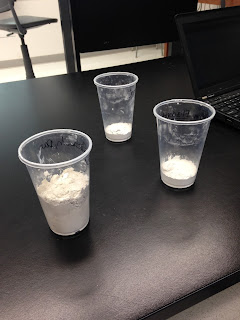So what is science? In an article (which can be seen by clicking the attached link) scientists, philosophers and educators get together and talk about what science really is. Below are some Q and A's on the article. http://www.defendscience.org/statement.html
Some of the answers given to the questions below do not connect with my personal thoughts or feelings, this is just all pulled from the article.
- Q: What is science? Science is means of inquiry
- Q: Isn't
most of what we know about the universe and world just a theory, not a
fact? (Explain what is theory and what is fact in terms of the general
population.):
- Fact: In science, an observation that has been repeatedly confirmed.
- law: A descriptive generalization about how some aspect of the natural world behaves under stated circumstances.
- hypothesis: A testable statement about the natural world that can be used to build more complex inferences and explanations.
- theory: In science, a well-substantiated explanation of some aspect of the natural world that can incorporate facts, laws, inferences, and tested hypotheses.
- Q: What is anthropomorphic climate change, is it science? It is the change in our climate due to humans. Humans are some of if not entirely the most destructive of creatures. We take, take and take but don't give back. We are destroying this planet at a rate so fast that we will run out of natural resources (things that took billions of years to be created) in our grand-great grand children's lifetimes. The way we operate is going to destroy our planet. It is already changing our climate. We are melting Polar Caps, we are single handedly causing global warming. But it isn't just the carbon footprint of us everyday Joe's...no it stems way higher. Huge cooperation pouting our air and lakes are doing this. These same big money people who are attacking science. This is science, everything in one way or another is science, but big money people and companies don't see it, they don't want to see it, because they would rather get rich, than create a better world for our youth and their future. They don't want to see or admit it because they can't handle looking themselves in the mirror.
- Q: What is the young Earth theory, is it science? It is a religious belief that the earth universe and all existence were created by God. In my opinion it is science. We don't know how the Earth came to be. Some people believe God created it and we will know and understand when we get to Heaven. Others do not think that way. Science is a study of an idea. Someone asks a question then tests, experiments and observes to see more. To some people this needs to be a tangible process, to others prayer is enough. Some people use texts books, others use the Bible. I don't think you entirely have to discriminate between religion and science, I think in someways they can go hand in hand.
- Q: What is intelligent design, is it science? It is the theory that life, or the universe, cannot have arisen by chance and was designed and created by some intelligent entity. I for the same reasons above believe it is considered science.
- Q: What is the theory of fossil succession, is it science?
In the same way that the oldest rocks are found in the bottom layer of the earth, the oldest fossils also followed the same chronology as they appear in the same set of rock layers, or strata. Ultimately this is what the theory deals with. I do think it is a science. You are studying something based on an observation. - Q: Can a person accept principles of the Nature of Science and still believe in religion or have faith? According to the people in this article, no. Me personally, I feel they can. I understand and accept many principals of nature. I don't think evolution is wrong, but it just isn't my belief. I think it is very important as an educator to teach both sides. As a mother I will teach my children what the bible says, but also explain evolution, they will have questions and be confused, but I feel I will bring them up to understand the importance of knowing both, but maybe just believing in one. As a teacher it isn't that simple. There are pretty strict rules on what you can and can't say in terms of religion. This is done so we aren't being biast against any religions because it is very possible we will have students that are a part of families that all may have separate beliefs. That is fine, and I understand that we don't have time in a school year to spend teaching about all the different beliefs of evolution or how humans came to be. In science we teach evolution because that is what people have proof of. I don't think it is wrong to teach it. My answer is hands down to this, because as a teacher you need to know your boundries. You can have personal beliefs and still teach the principals of science.
- Q: Where and/or what is the power of science? "
And today this dominant political agenda is profoundly allied and intertwined with an extremist (and extremely anti-science) ideological agenda put forward by powerful fundamentalist religious forces commonly known as the Religious Right." - Q: Is science under attack? Acording to this article, yes. The problem is these attacks are coming from people who don't know what science really is or the importance of it. They are coming from fundementalists. "These fundamentalists now have extensive influence and representatives in major institutions of the U.S. government, including Congress and the White House. This itself goes a long way towards explaining why science itself is under such unprecedented attack."












